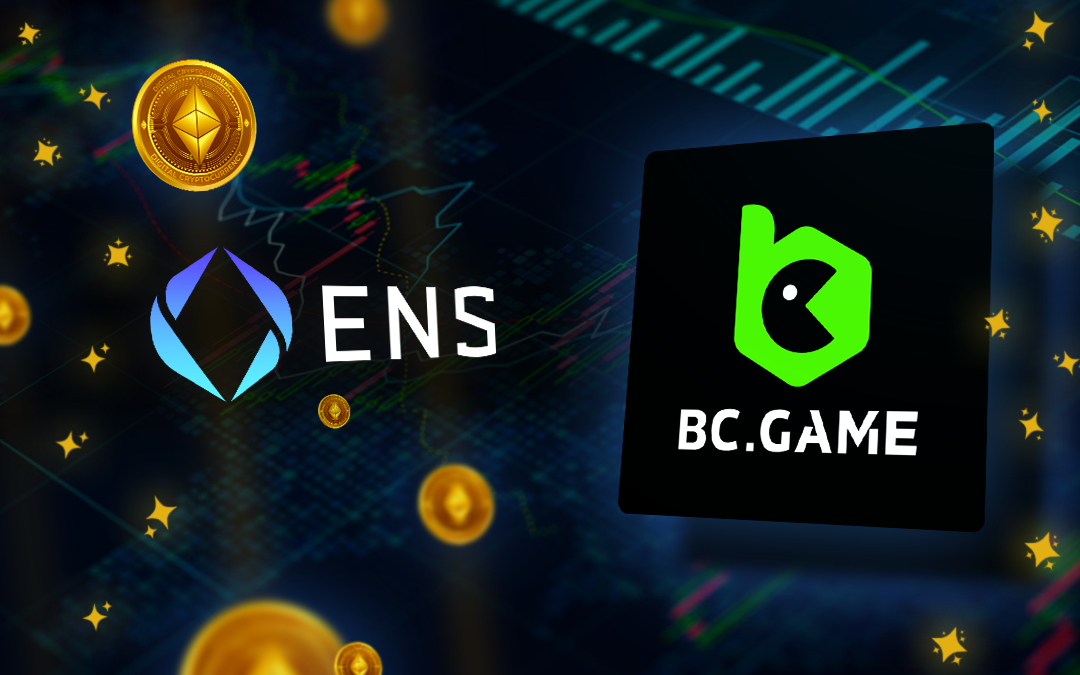The crypto world continues to deliver exciting new projects to take us to the next technological dimension. One recent development is the Ethereum Name Service (ENS) which hopes to make life easier for internet users.
Since its inception, the internet has evolved incredibly – how did we ever live without it? Today, browsing the net for information, online shopping, or even playing at the best crypto casino is as simple as clicking a button – with most internet users bookmarking their favourite sites for quick access.

Things have not always been so simple, though. The early days of using the internet were a bit more cumbersome. Users had to punch in long domain names and internet protocol addresses to find what they wanted. If you wished to access a website, you would need to type out the site’s full IP address, for example, 54.265.171.141.
Developers worked to circumvent this drawn-out process and eventually created the Domain Name System (DNS). The DNS did match the long sequence of IP addresses to easily identifiable names.
People could now remember and type into the search bar, for example, https://bc.game/. ENS is the subsequent development in this chain of events. Read on as we delve into the dynamics of Ethereum Name Service to discover what it is all about.
What Is The Ethereum Name Service?
Like IP addresses, Crypto addresses are a long string of letters and numbers coded to be understood by computers. These long crypto addresses are confusing and can lead investors and traders to lose funds. It is where ENS comes to play. ENS is a distributed technology founded on the Ethereum blockchain.

It provides simplicity to long crypto addresses – similar to how DNS works with the traditional internet. Essentially, it is one URL like a website name linked to a specific crypto address. ENS takes a user’s long crypto address and links it to a name that the person can remember and read quickly.
For example, a crypto address like 0xDC25EF3F5B8A186998338A2ADA83795FBA2D695E may be linked to onlineshop.eth . Users can buy and manage their domains through ENS technology in the crypto space. They can enjoy secure and decentralized transactions without needing to punch in long crypto addresses. In addition, the risk of errors is minimized as there is less likelihood of incorrectly typing out a recipient’s crypto address when sending crypto.
ENS and DNS share striking similarities. Both types use a system of hierarchical names referred to as domains. Here, the creators and domain owners enjoy complete control over top-level and subsequent domains. There are, however, critical differences between the two types.
ENS vs. DNS
ENS and DNS are protocols that determine how specific operations are resolved on Web2 or Web3. DNS converts a website’s IP address into a simple, readable string, referred to as a URL. On the other hand, ENS converts an Ethereum address into a simple, readable string formatted like a URL.
In essence, both types work like a phone book. You can search for a name in the phonebook and find the number directly connecting to that person. DNS is an element of internet protocols that helps Web2 to operate efficiently. Web3 is a relatively new concept – a decentralized version of the internet – and is still in the development stage, a scenario that allows ENS to play a role in the future. ENS aims to allow users and applications to read and share crypto addresses easily. It also makes Web3 easier to navigate around. As the evolution of Web3 continues, developers will more likely develop protocols around ENS as opposed to DNS.
The ENS Token
The ENS token is an ERC-20 token closing in on the top 100 biggest cryptocurrencies. ENS token has a maximum supply of 100 million coins and a circulating supply of 19.6 million. Approximately 25% of the total ENS supply was airdropped to holders of ETH, another 25% was distributed to ENS contributors, and the remaining 50% was allocated to ENS DAO. The ENS token is created on the Ethereum blockchain and plays a specific role in the ENS community. It is done by submitting proposals and casting votes to influence the future development of ENS. ENS community members can use these tokens to communicate changes they wish to see in the project and the organization.
How Does ENS Work?

ENS works similarly to DNS in a hierarchical system that gives the domain owner total control over subdomains. For example, the owner of realcrypto.eth can create admin.realcrypto.eth and services.realcrypto.eth – easy enough, right? Considering that ENS is angled towards WEB3 users, those who want to create a Web3 username can go to the ENS app and search for an available domain name.
Once you have found a suitable domain name, there’s a simple registration process to follow – including payment of a yearly subscription fee. You can start linking that domain name to your crypto wallets and websites and can begin creating subdomains if you wish. Once you have created your domain, you’re pretty much good to go. Remember that ENS domains are very limited, and you may be in a brawl with fellow crypto enthusiasts hoping to secure their domain name early.
Domain Flipping
Some crypto community members have seized this opportunity and exploited the market with ENS domain flipping. Essentially, they buy popular domain names cheaply. Then they sell them for a profit to a long line of eager customers hoping to secure easy domain names. Such is the extent of ENS domain flipping that exchange.eth sold for over $600,000 or 6,660 ETH during weather.eth sold for $27,000 or 300 ETH at the ENS auction. Another exciting thing about ENS is that it doesn’t only support .eth but also popular DNS names that include .com, .io, .org, and .app – to name a few.
What Can You Do With ENS?
For crypto enthusiasts who get confused with multiple addresses when sending funds, ENS is precisely the solution to help with that. Nobody remembers their friends’ mobile numbers – they save them under names on their devices – the same principle applies here. ENS allows users to convert long, confusing numbers into simple, easy-to-remember words. It helps to create a more effortless experience. It reduces errors when transferring funds, ensuring you don’t miss digits when copying and pasting lengthy crypto addresses.
As mentioned above, ENS domain owners can create subdomains from which they can assign data. It is not restricted to crypto wallets and can be used to direct smart contracts, transactions, or even metadata – flexibility and adaptability are neatly packaged. With the evolution of Web3, more development has gone into partnering ENS with a unique file storage system called IPFS. It will undoubtedly increase the effectiveness of ENS in the decentralized web space – making it suitable for domain owners and website users. While these are some things that you can use ENS for, there are plenty more use cases in the pipeline.
Why is ENS Important?
ENS was created for Ethereum smart contracts and is native to the Ethereum ecosystem. Because of this, it is not vulnerable to dangerous security issues that often plague DNS systems. The DNS records of names and domains are stored on a centralized server with DNS systems. It, of course, is the very place hackers try their level best to breach. In October 2020, at the height of the pandemic, Google’s threat analysis group observed a staggering 180,000 cyber-attacks on DNS systems.
It was together with other network targets from Chinese internet service providers. That alone will make internet users more comfortable using ENS systems built and secured on Ethereum’s blockchain and cannot be destroyed. ENS is also important because names and addresses become more transparent and much easier to interact with when compared to DNS systems. Anyone has the freedom to register and create a .eth domain through the auction process. As with similar auctions, the highest bidder wins the domain name. Subsequently, the winner can create multiple subdomains they use for their purposes or lease out. Users on the Ethereum blockchain have the perfect platform to establish themselves and become a clear point of contact amidst a sea of crypto addresses.
How to Get Your ENS Domain

Users with an Ethereum wallet such as MetaMask can go to manager.ens.domains and search for the available domains. Once a suitable domain is found, the system is intuitive and seamlessly walks you through the registration process.
Users must confirm two transactions from their crypto wallet as part of the registration. Those registering will need to choose the years they wish to register the domain for – with rent charged around $5 per year paid in ETH. Once confirmed, domain owners can set up different addresses or information they want that domain name to link. The same is for subdomains.
ENS and Crypto
You may have gathered that Ethereum Name Service brands itself as an open public utility centred on the ENS community. It operates based on a decentralized nature and community governance.
In this model, ENS hopes to position itself as the foundation of the crypto and Web3 ecosystem. The crypto space is a technical field and can be daunting for those fresh to the crypto lifestyle. ENS goes a long way in easing fears.
It does this by making the world of crypto more accessible and much easier to use. By converting long series of numbers that are machine-readable public addresses into short and easy-to-remember names, users can easily interact with Dapps and transact with a host of cryptocurrencies and NFTs.
In addition, the ENS ecosystem has grand plans to link all wallets, websites, and subdomains of a domain owner under one single link – making the process less technical and more user-friendly. It will allow for greater crypto adoption across the globe as the man on the street can easily use ENS. ENS wants to integrate the DNS namespace.
It is great for owners of DNS domains, as they can claim them on ENS. ENS will be a parallel extension of DNS, creating a cross-platform of Web3 usernames. It will become a vital component of the decentralized identity of ENS.
Final Thoughts
ENS has certainly made waves in recent times. It’s a step forward in creating easy access for users to interact with a blockchain. Like internet users stopped typing in the long IP addresses on DNS systems to navigate the web, ENS names will also increase.
It is due to its ease of use, increasing popularity, and usefulness in everyday life. In a nutshell, the blockchain and crypto world will become easily accessible to beginners. Ethereum Name Service will become a solid foundation for the future of crypto. It’s something that crypto enthusiasts the world over can’t wait for.















